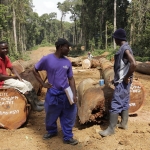India: ''Green Revolution'' Bad News for Poor Laborers
SIKRI KALAN, India -- The most successful farmers in this north Indian hamlet live in large, roomy houses made of cement and bricks. All of them own at least one tractor.
The farmers owe their prosperity to the use of modern farming methods, which have boosted agricultural output dramatically in the past decade.
Bullock-drawn ploughs have been replaced by tractors and motor pumps water the fields, which are sprayed with chemical pesticides and fertilizers. While the big farmers own one or more tractors, others hire the machines during the planting season.
But a large group of people in Sikri Kalan, in Uttar Pradesh state, have no share of this prosperity. These are the landless peasant households, who make up about a third of the 200 families in the village.
Things have worsened for Brij Pal, who lives in a small hut with mud walls and a thatched roof. He has no land of his own and can no longer find enough work in the village to support his five-member family.
The big farmers hire him for 100 to 125 days every year. He is paid 50 rupees (slightly more than a dollar) for a 10-hour working day. Moreover, he is exposed to serious health risks on the fields.
Last year, he fell unconscious after inhaling the chemical pesticide he was spraying on the paddy crop. He was rushed to a doctor by some villagers. His employer did not pay him any compensation -- not even the cost of treatment -- though it took Pal a full week to recover, during which he could not work.
He is lucky to be alive. Pesticide poisoning recently killed a farmhand in a neighboring village.
Pal's wife Savita tries to supplement their income, but women are paid even less for working in the fields -- that is, when they can find work. The traditional women's job of removing weeds from the fields has been taken away by anti-weed chemicals.
Sikri Kalan is a "Green Revolution" village. The term is derived from India's three-decade-old farming revolution, which was ushered in by high-yielding wheat crops that helped make the country self-reliant in food.
Mechanization, chemical fertilizers and pesticides have been central to the Green Revolution, which has brought farm abundance and prosperity to a section of Indian farmers, especially in the northern states of Punjab and Haryana that adjoin Uttar Pradesh.
But critics have long faulted the farm development strategy for not taking into account the needs of the majority landless farmers in this mainly rural nation.
Nathiram, another landless farmworker in the village, has leased one hectare of land from a big landowner. In exchange, he has to hand over four-fifths of the harvest. Last year, he lost money on his paddy crop.
Nathiram and his wife Mangi complain that mechanization has reduced job opportunities. Previously, 10 workers were needed to sow the potato crop on a large farm. Now this is done by just two people, says Mangi.
The problems of the landless peasants of Sikri Kalan are shared by others in neighboring villages and other Green Revolution areas of India.
According to peasants' rights activist Surat Singh, who has travelled widely in the Green Revolution villages of Uttar Pradesh, 40 percent of people in these villages are still below the poverty line.
"Today, farm workers at most places do not get more than 100 days work in an year. Mechanization has greatly reduced the need for human labor," he says.
There is even less work for landless peasants in India's main Green Revolution area of Punjab, where big wheat and paddy farmers use harvesting machines.
In Sikri Kalan, rich farmers still use the traditional harvesting method. Farmhands are paid wages in the form of grain during the harvesting season and landless peasant families can earn enough grain to last them for a few months.
The large-scale displacement of human labor by modern farm machines is not only worsening poverty, but is said to be causing serious social and psychological problems.
In Punjab villages, where farms use mechanized harvesting methods, there has been a sharp rise in school drop-out rates among children of the poor, and even suicides in landless peasant families.
In the western state of Maharashtra, affluent sugarcane farmers are importing harvesting machines. The so-called "sugar barons" of Maharashtra, who wield considerable political clout, are reported to be pressing the government to slash import duties on the expensive machines made in Germany and Australia.
- 181 Food and Agriculture



